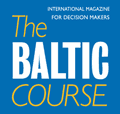
All rights reserved.
You may not copy, reproduce, republish, or otherwise use www.baltic-course.com content
in any way except for your own personal, non-commercial use.
Any other use of content requires the hyperlink to www.baltic-course.com.

Printed: 19.04.2024.
 PrintEducation and science in the Baltics’ future
PrintEducation and science in the Baltics’ future
 |
|---|
At the end of 207, the EU leaders formulated a new vision of
the European cooperation in education, research and, generally, in science. During
last two years, new initiatives are aimed at strengthening the EU-wide
strategic partnerships among universities: one of the most spectacular has been
the idea of creating so-called “European universities” to deal with the global
educational challenges and research competitiveness. These initiatives
suggest that European-wide research and education funding will proceed
through twenty “EU universities network” based on about six education-researchers’
consortiums.
“Smart growth” idea in universities’ education and research
In modern EU’s transition to “smart growth”, there is a
vital triangle uniting the European education, research and innovation spheres.
To materialize “the triangle”, a first step is the creation of European
“education centers or consortiums” of 20 European Universities in the coming 5 years. The consortiums will enable
students to obtain knowledge (and degrees) combining studies in several EU
countries, the process which is going to contribute to increasing international
competitiveness of the existing universities and the EU’s ambitious plan
of creating a European Education Area. There are presently two coordinating directions
among the EU states: a) through the Erasmus+ programs in the EACEA, see more
in: https://eacea.ec.europa.eu/erasmus-plus/selection-results/knowledge-alliances-2018_en;
and
b) through the DG EAC in improving the quality and efficiency of education and training, as well as
in enhancing creativity and innovation (including entrepreneurship) at all
levels of education and training, see more in: https://ec.europa.eu/info/topics/education-and-training_en
Although the higher education in the Lisbon Treaty -in
principle- has been the domain of the nation states, the research and
innovation activities are within a shared competence involving efforts from
both the EU institution and the member states.
Testing the EU-wide education and cooperation models
The EU-educational network
is regarded as the “trans-national alliances” of several European universities
by promoting quality and
competitiveness of European
higher education. The European Commission intends first to test “different
cooperation models” based on the following principles:
- an
alliance of partners from all types of higher education institution and
states;
- a cooperative long-term strategy focused
on sustainability and circular economy;
- student-centered curricula developed
jointly by the inter-university cooperation; and
- a comprehensive approach with
active students, academics and researchers’ cooperation in cross-disciplinary
teams to tackle the biggest European states’ issues.
Thus, the “cooperative models” idea has another aspect, i.e.
to streamline the European research-innovation-investment alliances across
languages, borders and scientific disciplines, to address modern European
socio-economic challenges.
On European university cooperation initiative in:
Financing the initiative
About € 60 mln of
European funding is already available to twelve experimental models to test the
concept and its transformative potential for the universities’ activities in
the mentioned “alliances” during 2019. Applications are now open through the
2019 Erasmus+ call; more information on how to apply is on the EACEA’s website:
https://eur-lex.europa.eu/legal-content/EN/TXT/PDF/?uri=CELEX:C2018/384/04&from=EN
The European university cooperation initiative does not define
a specific budget, but suggests that to reach the objectives each network
should get about €5-6 mln over five years, i.e. at least €100 mln in total. It
suggested a pilot project to start at the end of 2018, with the aim of
strengthening the ‘triangle’ of innovation,
research and education in Europe, and to encourage more European
integration in higher education and research (the networks is also opened to
the UK, US or other non-EU universities). More in:
https://www.universityworldnews.com/post.php?story=20171124150640414
The challenges addressed in the ECIU are also related to the
UN Sustainable Development Goals and will be worked out in international
cross-scientific teams with participants from academic communities in the
member states, other interested bodies and students’ councils.
Specific network is organized by the Charm European University in January 2019(so-called, Charm-EU), which will focus –among other issues - on the United Nations Sustainable Development Goals and includes universities in five EU states: Trinity College Dublin, University of Barcelona, Utrecht University, University of Montpellier and Eötvös Loránd University in Budapest. More in: https://www.uu.nl/en/news/launch-of-charm-eu-a-new-university-alliance-focusing-on-interdisciplinary-challenge-based-education
In the first stage, the EU funding enables 12 of the 54
networks to be selected with the Commission’s idea for “a shared, integrated,
long-term joint strategy for education with links, when possible, to research
and innovation to society”. The first pilot European Universities project will
test different “innovative and structural models” for implementing and
achieving long-term visions.
Source: https://www.universityworldnews.com/post.php?story=20190307070330629
Linking higher education with research and innovation
The EU-university’s proposal addresses a long-term vision of
linking higher education to research and innovation and to develop “new
innovative structural models” that could work towards added European value,
notably through its trans-nationality. European research dimension consists of
several European universities, which would “enable students to obtain a degree
by combining studies in several EU countries and contribute to the
international competitiveness of universities”.
In this way, the European Consortium of Innovative
Universities, ECIU is
going to “challenge the conventional thinking” including existing activities by
the European University Foundation (EUF)
and the University of the Greater
Region, UniGR (see below), to name a few.
The European
Consortium of Innovative Universities has had already 13
partner-universities.
See more: - on consortium of 13 universities in: https://www.eciu.org/ (from the Baltic States
the Kaunas University of Technology is participating); - on European university
foundation in: https://eurep.auth.gr/en/networks/campus_europae
(Latvian University participates in the EUF network).
There is another
ECIU’s group uniting universities in four EU states: the “University of the
Greater Region, UniGR”, which offers an opportunity to study and conduct
research in 3 languages, in 5 sub-regions and in 6 universities. The Greater
Region covers Saarland and Rhineland-Palatinate in Germany, the Grand Duchy of
Luxembourg, the French region of Lorraine and the Belgian Wallonia with its
French and German-speaking communities. More in: https://wwwen.uni.lu/international/university_of_the_greater_region_unigr
The activity of the Guild of European research-intensive universities should be specifically mentioned: it was founded in 2016 and comprising presently nineteen Europe’s most distinguished research-intensive universities in fourteen countries (from the Baltic States, Estonian Tarty University is participating in the Guild). The Guild is dedicated to enhancing the voice of academic institutions, their researchers and their students. The Guild is committed to the pursuit of excellence, the importance of truth-seeking and trust-building as the foundation of public life, and the creation of new knowledge for the benefit of society, culture, and economic growth. See more in: https://www.the-guild.eu/about/.